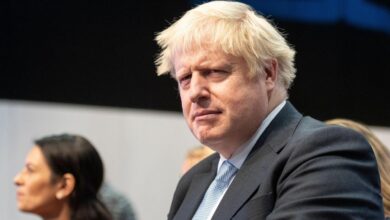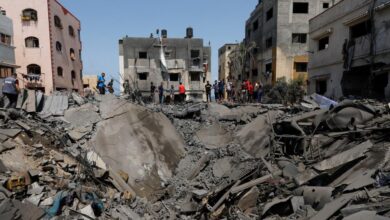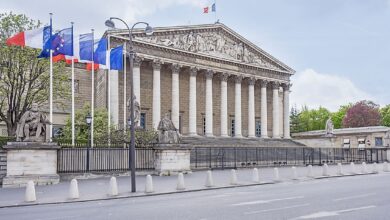
Colombias Leftist President Is Flailing
Colombias leftist president is flailing – Colombia’s leftist president is flailing, and the situation is far more complex than simple headlines suggest. President Gustavo Petro’s ambitious agenda, promising sweeping social and economic reforms, has collided with a reality of entrenched interests, political gridlock, and a skeptical public. This isn’t just about policy failures; it’s a story of high hopes dashed against the rocks of Colombian political realities.
We’ll delve into the specifics of his domestic and foreign policies, exploring both successes and significant setbacks.
From his attempts at peace negotiations to his economic reforms, Petro’s presidency has been a rollercoaster. We’ll analyze his approval ratings, the role of the media in shaping public perception, and the various challenges he’s faced, both internal and external. Ultimately, this is a crucial examination of a pivotal moment in Colombian history, and what it means for the future of the country.
Petro’s Domestic Policies

President Gustavo Petro’s domestic agenda represents a significant departure from previous Colombian administrations, aiming to address long-standing issues of inequality and social injustice through a progressive lens. His policies, however, have faced considerable challenges and sparked intense debate. This analysis explores the key aspects of his domestic policy, its impact, and compares it to the approaches of his predecessors.
Key Aspects of Petro’s Domestic Agenda
Petro’s domestic policies are broadly characterized by a focus on social justice, environmental protection, and economic transformation. Key initiatives include the ambitious “Paz Total” peace process aimed at ending armed conflict, significant reforms to the healthcare and pension systems, and a strong emphasis on rural development and agrarian reform. He also prioritizes tackling climate change through initiatives like halting oil exploration and promoting renewable energy sources.
These policies represent a radical shift from the neoliberal approaches of previous governments.
Successes and Failures of Petro’s Policy Initiatives
While some of Petro’s initiatives have shown early signs of success, others have encountered significant resistance and setbacks. The “Paz Total” peace process, for example, has achieved some breakthroughs in negotiations with various armed groups, leading to localized ceasefires. However, the process remains fragile and faces ongoing challenges related to implementation and the complexities of dealing with diverse armed actors.
Similarly, reforms to the healthcare system, while intended to improve access and equity, have faced logistical hurdles and criticism regarding financing and implementation. Conversely, some of his more radical proposals, such as a significant increase in taxation on the wealthy, have faced staunch opposition in Congress.
Comparison with Previous Colombian Presidents
Petro’s policies represent a sharp contrast to those of his predecessors. Unlike the predominantly neoliberal approaches of past administrations, Petro’s focus is on addressing social inequality and environmental concerns. Previous governments often prioritized economic growth driven by extractive industries, with less emphasis on social inclusion and environmental sustainability. This difference in philosophy has led to significant policy divergence, particularly in areas like energy policy, land reform, and social welfare programs.
For example, previous presidents have prioritized foreign investment in the oil and mining sectors, while Petro has sought to curtail such investment.
Economic Consequences of Petro’s Domestic Policies
The economic consequences of Petro’s policies have been mixed. Some economists express concern about the potential negative impact of his tax reforms on investment and economic growth. Others argue that his social spending initiatives could stimulate the economy and reduce inequality. The actual economic outcomes will depend on a variety of factors, including the success of his peace process, the implementation of his reforms, and global economic conditions.
The uncertainty surrounding these factors has led to volatility in the Colombian peso and investor hesitancy. Furthermore, his environmental policies, particularly those impacting the oil and gas sector, have led to concerns about potential job losses and reduced revenue for the government.
Projected vs. Actual Outcomes of Petro’s Policies
| Policy Area | Projected Outcome | Actual Outcome | Analysis of Discrepancy |
|---|---|---|---|
| Paz Total Peace Process | Significant reduction in armed conflict within 2 years. | Localized ceasefires achieved, but overall conflict persists. | Implementation challenges, complexities of negotiating with diverse armed groups have slowed progress. |
| Healthcare Reform | Improved access to healthcare for marginalized populations. | Increased access in some areas, but logistical and financial challenges hinder full implementation. | Funding issues, bureaucratic hurdles, and insufficient infrastructure have limited the impact. |
| Tax Reform | Increased revenue to fund social programs. | Revenue increase less than projected due to resistance and legal challenges. | Opposition from business groups and difficulties in implementing the new tax structure have reduced effectiveness. |
| Agrarian Reform | Significant redistribution of land to rural communities. | Limited land redistribution due to legal challenges and resistance from landowners. | Complex legal framework and strong opposition from large landowners have slowed progress. |
International Relations and Foreign Policy: Colombias Leftist President Is Flailing

Petro’s presidency has marked a significant shift in Colombia’s foreign policy, moving away from the traditionally close ties with the United States towards a more multipolar approach emphasizing regional alliances and South-South cooperation. This reorientation reflects Petro’s leftist ideology and his focus on addressing social and economic inequalities both domestically and internationally. The impact on Colombia’s relationships with other nations has been complex and multifaceted, resulting in both successes and setbacks.Petro’s approach prioritizes strengthening relationships with Latin American nations and forging new partnerships with countries outside the traditional Western sphere of influence.
This strategy aims to diversify Colombia’s economic and political partnerships, reducing its dependence on the US and fostering greater regional integration. His administration has actively pursued closer ties with countries like Venezuela, Cuba, and Mexico, reflecting a broader shift in Latin American geopolitics. This has led to both opportunities and challenges, particularly in the realm of trade and security.
Petro’s Diplomatic Initiatives and their Outcomes
Petro’s foreign policy has involved several high-profile initiatives, some successful and others less so. The re-establishment of diplomatic relations with Venezuela after years of strained relations is arguably his most significant achievement. This move, while controversial in some quarters, has opened up opportunities for increased trade and cooperation between the two countries, addressing long-standing border issues and facilitating the movement of people and goods.
However, the normalization of relations with Venezuela has also been criticized for overlooking human rights concerns within that nation. Conversely, his attempts to mediate the conflict in Venezuela have yielded mixed results, highlighting the complexities of regional diplomacy. The renewed focus on the Pacific Alliance, while intended to strengthen regional trade, has faced challenges due to internal political dynamics within member states.
International Community Response to Petro’s Presidency
The international community’s response to Petro’s presidency has been varied. Some nations, particularly those aligned with leftist ideologies, have welcomed his emphasis on multilateralism and South-South cooperation. Others, notably the United States, have expressed concerns about his approach to the war on drugs and his relationships with certain governments. This has led to a complex dynamic where Colombia seeks to balance its traditional ties with the US with its pursuit of a more independent and regionally focused foreign policy.
International organizations such as the UN have engaged with Petro’s government on various issues, including climate change and human rights, while also navigating the shifting political landscape in the region.
Economic and Security Implications of Petro’s Foreign Policy, Colombias leftist president is flailing
Petro’s foreign policy has had both positive and negative impacts on Colombia’s economy and security. The re-establishment of relations with Venezuela has the potential to boost trade and investment, but also poses challenges related to security and drug trafficking. Diversifying Colombia’s economic partnerships could reduce its vulnerability to global economic shocks, but also requires careful management to avoid undermining existing trade relationships.
On the security front, Petro’s emphasis on peace negotiations and dialogue has been praised by some, while others express concerns about potential threats to national security. The re-establishment of diplomatic relations with Venezuela, while offering economic benefits, also requires careful consideration of its implications for drug trafficking and border security.
Key International Partnerships Under Petro’s Leadership
The following list details key international partnerships that have been impacted under Petro’s leadership:
- Venezuela: Relationship significantly strengthened through the re-establishment of diplomatic ties, leading to increased trade and cooperation, but also raising concerns regarding human rights and security.
- United States: Relationship has experienced some strain due to differing approaches on issues like the war on drugs and human rights, resulting in a more complex and less predictable dynamic.
- Cuba: Relationship strengthened, reflecting a broader trend of increased cooperation between Colombia and leftist governments in Latin America.
- Mexico: Relationship has improved, characterized by increased diplomatic engagement and cooperation on regional issues.
- European Union: Relationship remains important, though the focus has shifted towards a more balanced approach, encompassing both traditional allies and emerging partners.
President Petro’s time in office has undeniably been turbulent. While his intentions to address deep-seated inequalities were laudable, the execution has been fraught with difficulties. The challenges he faces are immense, and the path forward remains uncertain. Whether he can navigate these obstacles and deliver on his promises remains to be seen. The coming months will be critical in determining the legacy of his presidency and the future direction of Colombia.
Colombia’s leftist president is facing serious headwinds, struggling to implement his ambitious agenda. It’s a stark contrast to the seemingly effortless dominance of fashion on television, as evidenced by the fascinating article on how fashion conquered television , which shows how carefully crafted images can sway public opinion. Perhaps the president needs a better stylist; his current image isn’t exactly projecting strength.
His flailing continues, overshadowed by the glamorous world of televised fashion.
Colombia’s leftist president is struggling; his ambitious reforms are facing serious headwinds. It makes you wonder about the long-term viability of strictly socialist policies, especially considering how even China’s communists, famously dedicated to central planning, ultimately embraced privatization – check out this fascinating article on how China’s communists fell in love with privatisation for a compelling case study.
The Colombian president’s challenges highlight the complexities of navigating a path between socialist ideals and economic realities.
Colombia’s leftist president is facing a tough uphill battle; his approval ratings are plummeting, and the country’s economic woes are deepening. To effectively navigate this crisis, his team could learn a thing or two from the subtle art of intelligence gathering, as outlined in this fascinating article on how spies should use technology , particularly regarding information analysis and strategic communication.
Ultimately, the president’s success hinges on his ability to gather and interpret accurate information, much like a skilled spy needs to do.






